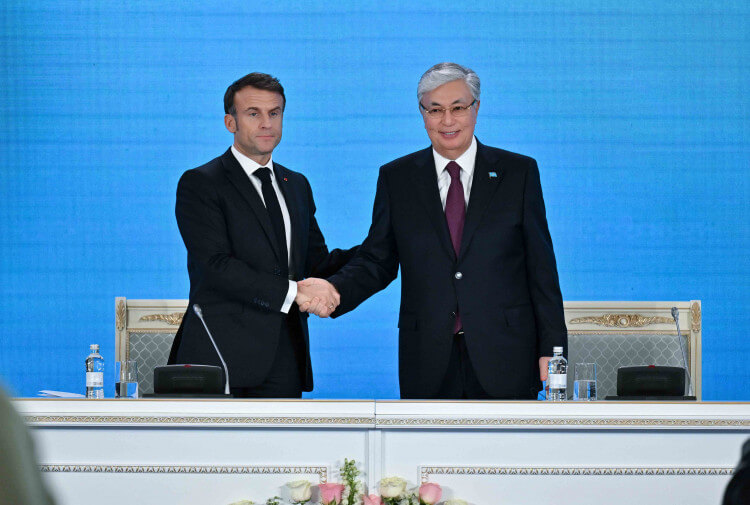The European Union still treats Central Asian countries cautiously regarding imposing sanctions on Russia, given that the region is one of the most significant channels.
European leaders have active communication with the leaders of the Central Asian countries, the former USSR federal republics, in 2 directions - increasing Europe's economic presence in the region and preventing circumventing sanctions against Russia.
The Central Asian states cooperate with the Europeans in both directions, even though the actual effects have been lacking.
The draft of the 12th package of EU sanctions against Russia looks to add 2 companies from Kazakhstan and one from Uzbekistan to the sanctions list.
They enable Russia to import dual-use goods or goods with a military purpose, primarily drones and high-tech equipment, from China.
Adding further Central Asian companies coincides with the US authorities' list and the previous decision to blacklist some of them. These companies serve as channels for supplying Russia with military hardware.
The region cooperates with the EU
The Central Asian leaders expressed their readiness to cooperate with the Europeans in closing all channels through which sensitive goods still reach Russia.
“We are grateful to the Kazakh authorities for decreasing the re-export of items, which are likely to end up in Russian military equipment”, said David O'Sullivan, EU Sanctions Envoy, during his visit to Kazakhstan and Uzbekistan this week.
Even though the countries of the region have not imposed direct sanctions on Russia since the annexation of Crimea in 2014, the EU has shown an understanding of their position, as they are still connected to the Russian economy since a large number of local emigrants still work in Russia.
The Europeans are reluctant to use harsher measures to try closing more Central Asian channels used for circumventing sanctions imposed on Russia
Business and even criminal ties of people from the region with Russian partners remain strong as a still-existing Soviet legacy.
The Central Asian states, however, have shown distancing from Russia since it invaded Ukraine and have been turning to other partners, which China and the EU want to take advantage of.
The EU is the third largest trade and investment regional partner, after Russia and China, with investments in infrastructure and large industrial complexes showing significant growth.
For this reason, the Europeans are reluctant to use harsher measures to try closing more Central Asian channels used for circumventing sanctions imposed on Russia.
The strengthening of sanctions against third entities, as planned in the 12th package of EU sanctions against Russia, is also a message to the leaders in the Central Asian region that they must discourage grey markets with Russia because they threaten the increasing cooperation with the EU.
They promised cooperation in the meeting with German Chancellor Olaf Scholz last September. "Germany should not be afraid that we would possibly do anything to get around the sanction regime”, said Kassym-Jomart Tokayev, the President of Kazakhstan in Berlin.
Kazakhstan is the centre of German economic presence in the region because 85% of the regional operations of German businesses go through its companies. Also, Kazakhstan is a crucial point for the overall European effort to provide a reliable geopolitical zone for its presence in Central Asia.
Stronger pressure is not definitive
However, at the same time, the countries of the Central Asian region continue to record an enormous growth in imports from the EU, particularly Germany, which shows circumvention of sanctions.
German exports to Kyrgyzstan in the first half of the year increased by almost 1,000% compared to last year. The exports of cars and parts increased by as much as 4,000%.
Other countries in the region - Kazakhstan, Armenia, and Turkmenistan - have imports from Germany larger than 150%, and these trends continued in the second half of the year.
The European Bank for Reconstruction and Development published a report at the beginning of the year according to which exports from the EU to Armenia, Kyrgyzstan and Kazakhstan increased by a total of 90% since the EU imposed sanctions on Russia due to the invasion of Ukraine.
 France intends to replace the existing uranium imports from Niger with imports from Kazakhstan
France intends to replace the existing uranium imports from Niger with imports from Kazakhstan
All these countries are part of the Eurasian Economic Union, a shared customs area with Russia, so it is definite they continue to serve as a significant intermediary for the import of missing goods from Europe into Russia.
Even though the space for the re-export of goods with a military purpose through Central Asia has been visibly decreasing, as a result of the cooperation in the region, stopping the outflow of other goods from the EU will continue to be much slower.
The tacit tolerance of this "non-military" export also suits large European manufacturers, particularly the automotive industry.
Furthermore, there have been concerns about the ongoing principal energy agreements, due to the possibility of increased European pressure on Central Asian authorities. Or, as an example, French intentions to replace the existing uranium imports from Niger—halted following the coup last July—with imports from Kazakhstan, following recent discussions of the French President Emmanuel Macron with the Kazakh leader in Astana.